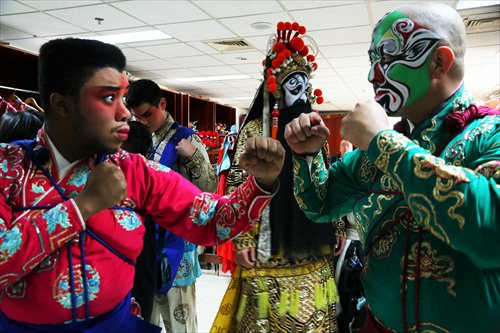Overseas students carry on China’s ancient Peking Opera tradition

An overseas student wearing Peking Opera face makeup Photo: Courtesy of Liu Lu

Two US students pose for a photo before a Peking Opera performance. Photo: Courtesy of Liu Lu
The passing of two Peking Opera masters, Mei Baojiu and Li Shiji, this year, has intensified discussions both in and out of opera circles concerning how the next generation will carry on this ancient tradition. The thought of Peking Opera fading away has even gotten some foreigners in China worried, as they see the art form as a charming link to ancient Chinese culture, even if it can sometimes be too complicated to understand.
"It's someone screaming and me not understanding anything of what is being said," Gontse Theo Nosi, an African who has been in Beijing for four years, told Global Times.
For Nosi, Peking Opera is full of characters with "wild and wonderful costumes" and requires "a certain amount of skill" to understand the story being told.
While Nosi's job at a commercial company has left him with little time to learn more about Peking Opera, there are many foreigners who have decided to dive into it headfirst. Opening its doors to overseas students in 1992, the National Academy of Chinese Theatre Arts (NACTA) has a number of students from around the globe who are looking to carry on the art form in their own way.
Kim Hong-soo and Rafael Caro Repetto are two such overseas students at NACTA. Kim is studying Chinese Opera Body Training, while Repetto is researching Chinese Opera Composition. Sitting down with the Global Times, they shared some of their experiences with Peking Opera and their opinions on this ancient art form.
Love at first sight
"The voices are totally different." Kim said excitedly, right after sitting down. He and Repetto had just finished watching a rehearsal by well-known Peking Opera singer Zhang Huoding for an upcoming performance.
"Different from other performers, she was very relaxed and gave each movement her own feeling," Kim said as he mimicked the hand motions used to reflect the thoughts of Zhang's character during a particular aria.
Kim was studying the performing arts before he ran across Peking Opera 15 years ago. He had been asking his teachers what the performing arts truly were, and at the suggestion of a tutor watched a video clip of a Peking Opera performance in Seoul.
"I was extremely astonished. I knew this was exactly what I had been seeking," he said.
"I then planned a tour to China with my tutor to watch a live performance in Beijing. At the end of the journey, I stayed."
Unlike Kim, Repetto's first experience with this oriental art form was, according to him, rather strange.
"The first time I watched live Peking Opera was when I was studying Chinese in Peking University. I completely had no idea about what was happening on stage, but an old lady sitting beside me burst into tears, which made me curious. "
According to Repetto, Westerners are sure to have a hard time when first watching Peking Opera. They tend to think of it in terms of Western Opera, but in reality the artistic and expressive approaches of Chinese Opera are completely different from Western Opera.
This leads to Peking Opera seeming very strange to foreign eyes.
"At first, there is percussion music before the main performers come out, so all you can see is an empty stage. And then the performers appear, with strange costumes, strange voices, odd lyrics and you can't even find any introductions to the lyrics," Repetto explained.
However, those old lady tears moved Repetto to try and discover their source. As his studies progressed, he too started understand the emotional undercurrent during performances.
"Like Professor Zhang Huoding's rehearsal today," he said as he turned to face Kim.
"I could feel her control of tone and volume. Both of them were exquisitely handled. This was something I couldn't understand before," he said as Kim nodded in agreement.
Looking to the future
As a key symbol of Chinese culture, Peking Opera emerged during the 18th century, right around the time that Western Opera was giving birth to a new genre, operetta, which later developed into the musical. It was also around this time that well-known composer Mozart was creating his world-famous work The Magic Flute.
Referring the long history of Peking Opera, both Kim and Repetto are confident that it won't fade away as easily as some people are currently talking about. In fact they were rather positive about its future.
"I'm planning to combine what I learn here with traditional South Korean Opera and create some new works. Peking Opera does not only represent Chinese art, but also Asian art and Oriental art; so I hope I can spread it to a global audience," Kim told the Global Times.
Repetto agreed: "I also hope Westerners can learn Asian art, and Asians learn Western art. We should communicate with each other."
Newspaper headline: The next generation